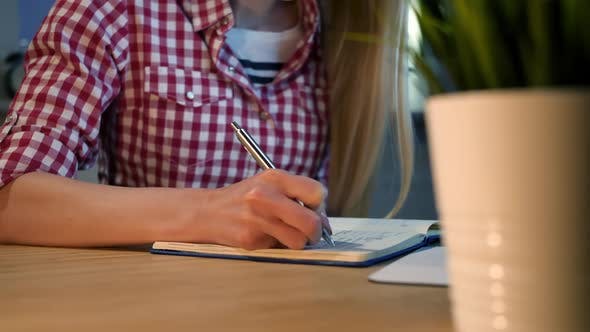A personal statement supports your application to study at a university or college. It’s a chance for you to articulate why you’d like to study a particular course or subject, and what skills and experience you possess that show your passion for your chosen field. What to write about You.
You’re telling admissions staff why you’re suitable to study at their university or college.
It’s important to remember you can only write one personal statement – it’s the same for each course you apply for. So, avoid mentioning any universities or colleges by name.
If you’ve chosen similar subjects, talk about the subject in general, and try not to mention courses titles. If you’ve chosen a variety of subjects, just write about common themes, like problem solving or creativity.
Here are some ideas to help you get started:
- Look at course descriptions and identify the qualities, skills, and experience it requires – you can use these to help you decide what to write about.
- Tell the reader why you’re applying – include your ambitions, as well as what interests you about the subject, the course provider, and higher education.
- Think about what makes you suitable – this could be relevant experience, skills, or achievements you’ve gained from education, work, or other activities.
- Include any clubs or societies you belong to – sporting, creative, or musical.
- Mention any relevant employment experience or volunteering you’ve done, such as vInspired Awards, Step Together, or Project Trust.
- If you’ve developed skills through Duke of Edinburgh, ASDAN, National Citizen Service, the Crest Awards scheme, or young enterprise, tell them.
- If you took part in a higher education taster course, placement, or summer school, or something similar, include it.
Personal circumstances
- If there are any personal circumstances that have affected your educational performance, outline them in your personal statement. For example, this might be something that caused you to miss school – such as a physical or mental health condition, or caring for a family member.
- If your personal circumstances have affected your qualification choices, you can mention this in your personal statement. For example, a change of school that did not offer the same options, or having gained non-different qualifications, skills, and experience to many other people (e.g. through the Armed Forces).
- If you have suffered financial hardship during your studies (e.g. received a bursary to cover the costs of your education), you can let the university know about that here.
If you have a question about writing your personal statement, don’t worry, you’re not alone! Here are some useful blogs to help:
- Five of the most frequently asked questions about personal statements, answered by admissions staff at uni and colleges
- Ten places to find pointers about writing your personal statement
- Aimee’s blog on how to complete your personal statement
- Charlotte’s blog on writing your personal statement
Sample Personal Statement For Masters In Public Health
Picking shells on a local beach as a ten-year-old girl one beautiful summer afternoon, I saw a crowd of people gathering some distance away. When I managed to squeeze inside the crowd, I saw two drowned boys lying on the beach. They had just been salvaged from the sea. Doctors in a nearby seaside clinic were immediately sent for but on that particular day, only one was on duty. She applied first-aid measures to one of the boys and asked a young man, an on-looker in the crowd, to follow what she was doing to save the other boy. Whereas the professionally-trained doctor save her patient with her expertise, the inexperienced young man did not really know how to proceed. By the time the doctor took over, the other boy was already dead.
That was my first experience of witnessing how proper medical treatment could miraculously save a person’s life out of impending danger and this experience was defining. I was determined to become an “angel in white” who could be equipped to contribute to the physical welfare of the people. This determination prompted me, by the time I completed my junior middle school, to seize the first opportunity to realize my aspiration—an education in nursing specialty at a local polytechnic school.
When I completed my studies three years later, I was employed by XX Hospital, XX Province, and I worked as a clinical nurse for three years. At that time, secondary education in nursing at a polytechnic school was the highest academic education one could obtain in China. Yet I was convinced that, with the social and economic development of China, nurses were bound to receive higher levels of academic training. Therefore I made persistent efforts to improve my English proficiency and taught myself all the advanced courses in senior middle school. Being fully prepared, I succeeded in entering the Junior College of XX Medical University when it administered the province’s and also the country’s unprecedented entrance examination in 1988.
For three years I underwent more rigorous and systematic training in nursing and I was the sole “Outstanding Graduate of XX Province” in my class. Upon graduation, I returned to my former hospital and as its first nurse with a junior college degree, I worked as a nursing instructor, responsible for training all the nurses of the hospital. Meanwhile, I continued to accumulate clinical nursing experience and further improve my English proficiency (in 1993 I scored 610 in my TOEFL test, which was a rare achievement among Chinese nurses at that time).
My seven-year professional experience as a nurse and my sound command of English, therefore, ushered in the golden period of my career. In 1994, I wrote a job-application letter to the American president of the newly-established XXX Hospital, which is jointed administrated by XX Medical University and the Medical Center of XX University. My impressive qualifications resulted in my exceptional recruitment by the hospital and ever since then, I have been working in predominantly American hospital culture and in an English-speaking environment under the leadership of the American vice president in charge of nursing. For nearly a decade by now, I have undergone several major transformations in my career, from a clinical nurse to an administrator—first as Nurse Manager, then as Medical-Surgical Nursing Director, and finally as Director of XX Office.
As Nurse Manager from 1994 to 1997, I introduced into my management the American Performance Evaluation System of Nurse Positions, which significantly standardized nurse conduct and improved nurse performance. Demonstrating distinguished professional performance and potential, I was promoted to work as Medical-Surgical Nursing Director from 1997 to 2002, supervising the nurses and their managers on a dozen of floors. I also directed various departments in their ward management, documentation of medical records, disinfection and quarantine, nursing, and continued education. I continued to introduce advanced American nursing concepts and procedures and offer regular vocational training to nurses as the hospital’s leading nursing specialist. I emphasized the total nursing concept and on the quality improvement of patient-oriented nursing services
My greatest challenge and achievement at this hospital so far is working as Director of XX Office. In November 2002, the top management decided that our hospital was to participate in the XX certification project administered by the United States’ XX, Joint Commission on Accreditation of Healthcare Organizations. The project is extremely challenging because XX certification is totally unprecedented in China (so far only two Asian hospitals have passed this certification), all the certification materials are in English and extensive contacts must be made with many experts based in the United States. The project encompasses all the fields of hospital management ranging from medical therapy, medical technology, nursing, administration, and even logistics. I was appointed as Director of XX Office for my professional knowledge as well as leadership caliber.
Under my leadership, the XX Office translated two thick volumes on XX Standards and Certification Inspection Process, modified the existing system and workflow in accordance with the system and workflow of the Medical Center of XX University, formulated both the short-term and the long-term work objectives, and established a highly efficient organizational framework. I organized the overall professional training and proposed and implemented sustained quality improvement. The diligent execution of my responsibilities has paved the way for the hospital’s final passing of the certification early next year.
Over the past decade, I have developed a full international perspective. In 1994, I paid a week-long visit to the XX Hospital in XX. From April to July 1996 I studied nursing management at the Medical Center of XX University and again in 2003 I studied hospital quality management there. In addition, I attended the International Summer Practicum on Quality Improvement and Accreditation at XX’s headquarters in XX and the 2003 Healthcare Quality Overview and Certification Workshop sponsored by XX for Healthcare Quality. Domestically, I have participated in nearly ten workshops, seminars, and programs in XX, XX, and elsewhere.
In terms of research, I have published about 10 research papers in leading technical journals of the country and co-edited a book XX. Since 1999, I have been serving as a member of the Surgical Academic Committee of XX Provincial Nursing Society and as such launched two national surgical general nursing workshops. Among countless honors and awards, I have won the Award for Innovation in Medical Science and Technology of XX Province for my contributions to the project XX. Another project I have participated in XX is applying for sponsorship from the Provincial Education Commission as a major research project. What’s more, I completed my on-job undergraduate program (1998-2001) in the specialty of Executive Administration, obtaining a B.A. degree in jurisprudence.
In China, it used to be supposed that the construction of a well-developed public health system is not so important and that only economic development is paramount. The SARS epidemic last year has exposed the fragile condition of China’s public health system. My involvement in XX certification made me realize earlier than others that China sorely needs to make drastic efforts to perfect its public health system. An examination of my own academic background in nursing, my academic and professional background in administration, my exposure to the American medical system and practices, makes it apparent to me that a Master’s program in Public Health is most appropriate for me in further facilitating my career development. For this reason, I would like to apply for an MPH program from XX School of Public Health, concentrating on Health Policy and Management.
I am interested in studying at XX School of Public Health because I believe it can give me an unparalleled education on public health on the policy and management level. Founded in 1922, your school has long enjoyed a prestigious academic position and has been doing pioneering work in improving the health service system and reducing health risks in the United States and throughout the world. I hope to be exposed to innovative research and high-level academic training to acquire effective management skills and scientific decision-making techniques.
A systematic education at Harvard will be vital for my future career as a senior public health administrator in that it will allow me to incorporate American administrative patterns of public health with China’s realities. I will be able to perform some creative work in reforming China’s existing public health system and make it serve a greater multitude of people. In this regard, I deem my proposed study as a very meaningful part of my career pursuit.
Sample Personal Statement for Master in Public Health Pdf





